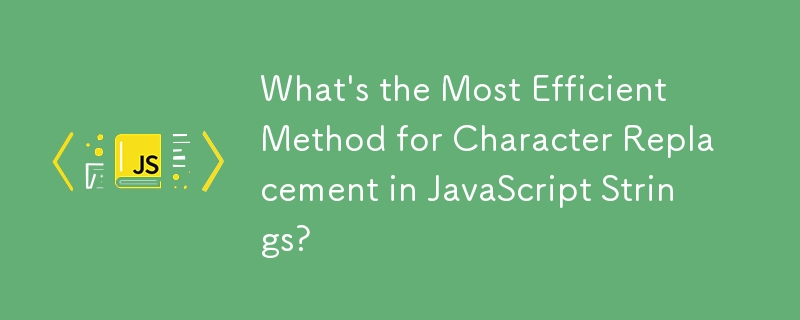

Efficient Character Replacement in Strings: Comparing Techniques
In JavaScript, replacing characters or substrings within strings is a common requirement. However, the choice of method can impact performance and efficiency. This article explores three approaches to accomplish this task: while loop, for loop, and regular expressions.
Regular Expressions (with 'g' Flag)
Using regular expressions with the 'g' (global) flag offers the most concise and fastest solution. The syntax is simple:
str.replace(/pattern/g, "replacement")
This expression matches all occurrences of 'pattern' and replaces them with 'replacement'. For example, to replace all instances of "foo" with "bar":
str.replace(/foo/g, "bar")
While Loop
While loops can also be used for string replacement, but they are generally less efficient than regular expressions. The code iterates through the string, character by character, and performs the replacement manually.
var str = "foobar";
var newStr = "";
while (str.indexOf("foo") != -1) {
newStr += str.substring(0, str.indexOf("foo")) + "bar";
str = str.substring(str.indexOf("foo") + 3);
}
newStr += str;For Loop
For loops provide an alternative to while loops but are also less efficient than regular expressions. This approach iterates over the string's indices and performs the replacement directly.
var str = "foobar";
var newStr = "";
for (var i = 0; i < str.length; i++) {
if (str.charAt(i) == "f" && str.charAt(i + 1) == "o" && str.charAt(i + 2) == "o") {
i += 2;
newStr += "bar";
} else {
newStr += str.charAt(i);
}
}Performance Comparison
Benchmarks have shown that regular expressions with the 'g' flag consistently outperform both while and for loops for large strings and multiple replacements. For smaller strings and infrequent replacements, the differences may be negligible.
Thus, for efficient and concise character replacement in JavaScript strings, regular expressions with the 'g' flag remain the preferred approach.
The above is the detailed content of What\'s the Most Efficient Method for Character Replacement in JavaScript Strings?. For more information, please follow other related articles on the PHP Chinese website!




